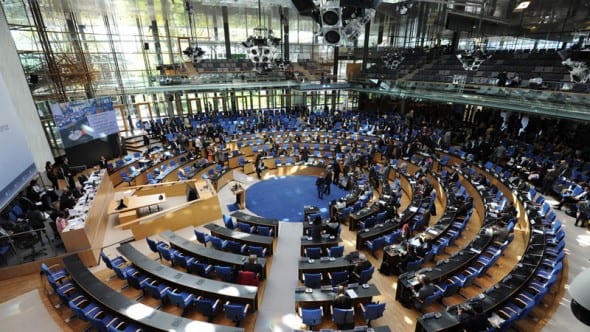A new draft of the global climate change pact due to be signed in Paris this December has been released by the UN, calling on all nations to commit to mitigation policies that reflect their highest possible ambition, and to toughen these commitments every five years.
The 20-page draft, released by the co-chairs of the UN climate negations in Bonn on Monday, increases the pressure on countries like Australia, whose low-ball emissions reduction target has been roundly criticised for lacking ambition and not having a sufficient policy framework.

The Ad hoc working group on the Durban platform (ADP), the body tasked with negotiating the agreement, prepared the greatly pared-back draft – it is less than a quarter of the length of the last version – as the basis for negotiation of the draft Paris climate package.
And while it leaves many key details unclear or unstated – namely when parties should reach peak emissions growth, or how quickly curbs will have to be ratcheted up – it does include a commitment to hold warming to no more than 2°C above pre-industrial levels; a target the science dictates as crucial to avoid irreversible, catastrophic climate change.
The report also contain a draft of the decision that will operationalise the agreement from 2020 and a draft decision on pre-2020 ambition.
This suggests each party should regularly communicate a nationally determined mitigation contribution or commitment, which should “reflect a progression beyond its previous efforts, noting that those Parties that have previously communicated economy-wide efforts should continue to do so in a manner that is progressively more ambition us and that all Parties should aim to do so over time.”
And these commitments, the report says, “should reflect the Party’s highest possible ambition, in light of its national circumstances, while also being quantified or quantifiable and unconditional, at least in part.”
The key directive for policy makers, however, is that “successive nationally determined mitigation contributions or commitments should be communicated every five years, unless decided otherwise by the CMA.”
The draft also stresses the importance of international cooperation, and support for adaptation efforts – particular those of developing countries and those most vulnerable to the effects of climate change.
And it notes the need for all governments to be on the same page, in terms of what the science tells us, and what we need to do about it.
Parties should “share the goal of increasing resilience and reducing vulnerability to climate change, recognising that adaptation is a challenge faced by all, with local, national, regional and international dimensions, and that it is a key component of and contribution to the long-term global response to climate change to protect people, livelihoods and ecosystems,” the document says.
“Parties (should) recognise that, the greater their mitigation efforts, the less adaptation will be needed.”
Just a few weeks ago, before Malcolm Turnbull took over as Prime Minister, these two requirements might have ruled Australia out.
But with the climate ambivalent Tony Abbott now replaced, and his climate denying business advisor Maurice Newman out of the political picture, we are a better chance of meeting them.
But there is still much work to do. Indeed, according to those who know, the new focus of the narrowed-down draft document exposes the weakness of current Australian policy.
“The contours of the Paris agreement are becoming increasingly clear,” said Climate Institute deputy CEO, Irwin Jackson, in comments to RenewEconomy.
“The inevitable trend to stronger action is embedded in the draft agreement with countries needing to progressively strengthen action through time.
“Core details still need to be resolved, but this again just highlights that Australia’s lack of stable, scalable and credible domestic policy to moderise our economy is leaving us flat footed in a world turning to clean energy,” he said.










